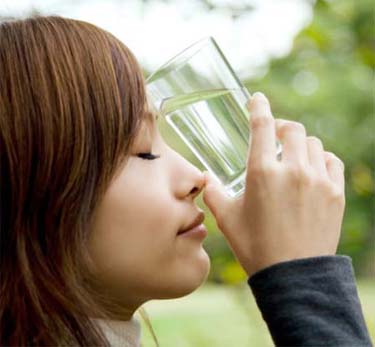Jan 07, 2026
Jan 07, 2026
 Well water, pond water, rain water - there are many types of water described in Ayurvedic texts, and each has a therapeutic value, just as food does.
Well water, pond water, rain water - there are many types of water described in Ayurvedic texts, and each has a therapeutic value, just as food does.
Water represents soma, the nourishing, cooling quality that is associated with lunar energy. It helps with digestion, cools and balances Pitta dosha, supports Kapha, and counteracts the dryness of Vata. It nurtures, lubricates and also detoxifies when it flows out of the body as urine.
Water, when properly absorbed by the body, has several healing qualities:
Helps to remove fatigue (Shramnashana)
The healing effects of water can be enhanced using Ayurvedic methods.
Water for Cleansing
Sometimes people have dry skin and unquenchable thirst even though they drink lots of water. The deeper physiology is not getting enough moisture. This occurs when the person's agni is low and ama blocks the micro-channels (shrotas) which carry water to the cells. In order to cleanse the channels and enhance moisture absorption, Ayurvedic texts recommend boiling the water for various lengths of time, creating a therapeutic water called ushnodaka. Another method is to add spices or herbs to the water after boiling.
Why It Works
When the water boils, it gets charged with heat, becoming sharper in quality (sookshma). This sharpness allows it to cleanse the channels and penetrate deeper levels of the physiology. Spices create an added therapeutic effect by interacting with the water on the molecular level. Spices create different effects on the body through aroma and taste. It becomes easier for the body to flush out toxins and impurities because of the sharpness of the agni (heat) in the water and because of the sharpness of the spices. Over time, it cleanses the channels so the water is unobstructed as it travels into the body to hydrate the tissues, and travels out carrying waste.
Ancient texts talk about the difference in the rate of absorption of regular water vs. boiled water:
Water for Your Body Type
An Ayurvedic expert can design a therapeutic water recipe to give a specific benefit. One water recipe might enhance immunity, another might cleanse the skin, another might help with prostate imbalance. You can also choose a spice-water recipe for your body type or imbalances.
Vata Balancing Water
Boil two quarts of water for 5 minutes. Take it off the heat and add 3 leaves mint, 1/2 t. fennel seed, and 1/4 t. marshmallow root. Place the water in a thermos. Sip it throughout the day at a warm but not hot temperature.
Pitta Balancing Water
Boil two quarts of water for 2 minutes. Take it off the heat and add 1/4 t. fennel seed, 2 rose buds, and 1 clove. Store it hot inside a thermos, but before drinking pour it into a cup and let it cool to room temperature in summer. In winter, it can be slightly warmer.
Kapha Balancing Water
Boil two quarts of water for 5 minutes. Take it off the heat and add 3 holy basil leaves, two thin slices of fresh ginger, 1/4 t. of cumin, 1/2 t. of fennel. Place the water and spices in a thermos, and sip the water at a hot or warm temperature throughout the day.
How Much is Enough?
How much water you should drink depends on your age, how much physical work or exercise you do, the weather, your diet, your stress levels, your herbal food supplements, and your body type. The warm Pitta types usually are thirstier than the watery Kapha types. Vata types are often constipated or have dry skin and thus need to drink more water. I usually recommend two quarts of spice-water a day, but every person has to determine their own individual needs. Make your spice water first thing in the morning and sipping it every fifteen minutes throughout the day. Drink plain water after 7:00 p.m., as spice-water is too enlivening to drink right before sleeping. If you don't finish the spice-water by then, throw it out and start fresh in the morning. You may want to drink some plain water during the day as well. If you have been exercising and need to drink a full glass of water, it's better to drink plain water rather than the spice water.
Water at Meals
Ayurvedic texts also recommend sipping plain water at meals, because Ayurvedic food already contains spices and you don't want to overwhelm the body. On the other hand, if you are eating a plain meal without spices, then the spice-water will help digestion. A cup of water at meals is good, but it depends on what you are eating. If you are eating soup or dhal, you'll need much less water. If you are eating a higher quantity of dry foods, such as crackers, you'll need more. Water at meals can be room temperature or hot, depending on your body type, but should never be ice-cold, as that would douse the digestive fire. Forty-five minutes after the meal, you may suddenly feel thirsty, and then it's a good idea to drink a lot of water as the body needs it for digestion. In between meals you can sip the spice-water. You will be surprised how something as simple as water can enhance your health.
Disclaimer:
Information provided in this article is for the sole purpose of imparting education on Ayurveda and is not intended to diagnose, treat, cure or prevent any disease. If you have a medical condition, please consult your physician.
14-May-2002
More by : Vaidya Rama Kant Mishra